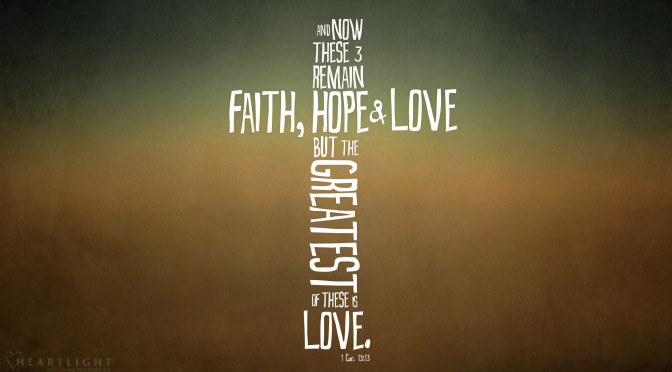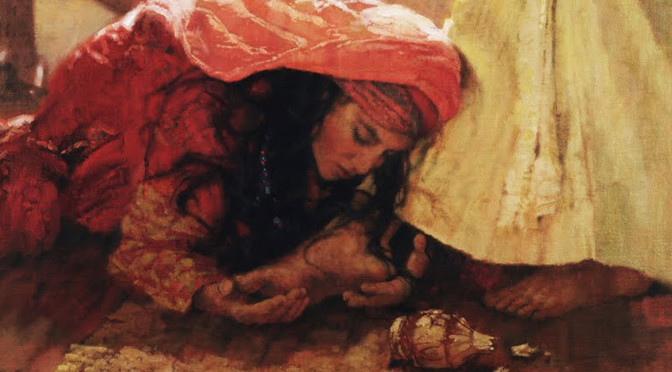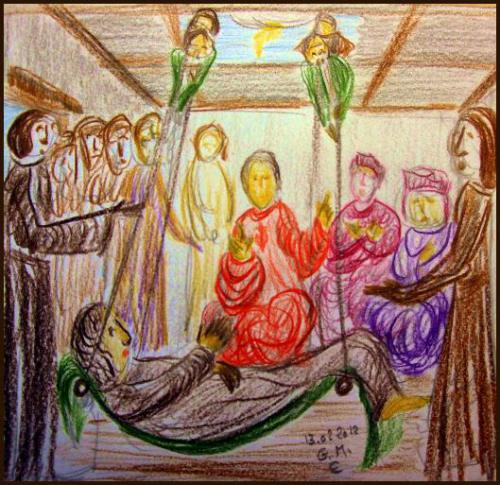Caitlin Trussell with Augustana Lutheran Church on September 4, 2016
[sermon begins after 2 Bible readings]
Philemon 1:1-21 Paul, a prisoner of Christ Jesus, and Timothy our brother, To Philemon our dear friend and co-worker, 2 to Apphia our sister, to Archippus our fellow soldier, and to the church in your house: 3 Grace to you and peace from God our Father and the Lord Jesus Christ. 4 When I remember you in my prayers, I always thank my God 5 because I hear of your love for all the saints and your faith toward the Lord Jesus. 6 I pray that the sharing of your faith may become effective when you perceive all the good that we may do for Christ. 7 I have indeed received much joy and encouragement from your love, because the hearts of the saints have been refreshed through you, my brother. 8 For this reason, though I am bold enough in Christ to command you to do your duty, 9 yet I would rather appeal to you on the basis of love—and I, Paul, do this as an old man, and now also as a prisoner of Christ Jesus. 10 I am appealing to you for my child, Onesimus, whose father I have become during my imprisonment. 11 Formerly he was useless to you, but now he is indeed useful both to you and to me. 12 I am sending him, that is, my own heart, back to you. 13 I wanted to keep him with me, so that he might be of service to me in your place during my imprisonment for the gospel; 14 but I preferred to do nothing without your consent, in order that your good deed might be voluntary and not something forced. 15 Perhaps this is the reason he was separated from you for a while, so that you might have him back forever, 16 no longer as a slave but more than a slave, a beloved brother—especially to me but how much more to you, both in the flesh and in the Lord. 17 So if you consider me your partner, welcome him as you would welcome me. 18 If he has wronged you in any way, or owes you anything, charge that to my account. 19 I, Paul, am writing this with my own hand: I will repay it. I say nothing about your owing me even your own self. 20 Yes, brother, let me have this benefit from you in the Lord! Refresh my heart in Christ. 21 Confident of your obedience, I am writing to you, knowing that you will do even more than I say.
Luke 14:25-33 Now large crowds were traveling with [Jesus]; and he turned and said to them, 26 “Whoever comes to me and does not hate father and mother, wife and children, brothers and sisters, yes, and even life itself, cannot be my disciple. 27 Whoever does not carry the cross and follow me cannot be my disciple. 28 For which of you, intending to build a tower, does not first sit down and estimate the cost, to see whether he has enough to complete it? 29 Otherwise, when he has laid a foundation and is not able to finish, all who see it will begin to ridicule him, 30 saying, “This fellow began to build and was not able to finish.’ 31 Or what king, going out to wage war against another king, will not sit down first and consider whether he is able with ten thousand to oppose the one who comes against him with twenty thousand? 32 If he cannot, then, while the other is still far away, he sends a delegation and asks for the terms of peace. 33 So therefore, none of you can become my disciple if you do not give up all your possessions.
[sermon begins]
What is your deepest prayer? The longing of your heart? Can you even put it into words? Some of us can and some of us can’t. My public prayers come out in a somewhat organized way so that others have a shot a following along. The silent prayers of my heart and mind? Not so much. Those prayers take flight like a hummingbird – first here, then there, then over there – a jumble of images, people’s faces, sentence fragments, sometimes just a single word. It’s why I occasionally pray prayers written by other people. Their words can chill out my search for words and help me let go into prayer.
Paul’s writings can land and lift like prayers. Certainly not every word he’s written, but there are moments. When I started reading Philemon a couple weeks ago it was that kind of experience. The way he opens in greeting with grace and peace giving thanks for his friends. His “appeal to [Philemon] on the basis of love” on behalf of Onesimus.[1] Challenging Philemon about who a co-worker in the gospel can be.
Paul’s words to Philemon flutter at us. There’s a sweetness on one side and steel on the other. Love, love, love and do, do, do. Paul loves Philemon AND Onesimus. He wants them to get along in a new way. In Christ. So he writes a letter. From prison. So many powerful words have come from sitting in captivity. Bonhoeffer wrote in a concentration camp, Dr. King in a Birmingham Jail, and, apparently, prison inspired Paul to write too.
Writing in prison is definitely a thing. In prison there’s time. A lot of time. When freedom is stripped away and there’s no room for choice, time opens up. These people that I just named wrote before they were in prison as well. It’s just that some of their most memorable writings came from prison. Prison’s stark reality seems to bring a different kind of clarity. If there’s little more to lose then for some people there seems to be even more to say.
I’d like to see Philemon’s response to Paul. And then I wish we had a transcript from Onesimus. I want to know what these three men are thinking as this negotiation takes shape. I can imagine all kinds of thing about Philemon. Just like I can imagine that Onesimus has a bunch of opinions too. Regardless, Paul has a lot to say to Philemon about changing his behavior.
How does someone stop doing something and start doing something else? What are the ways and means that that happens? Ideally, it comes from the inside. Self-awareness of something and then a strategy for change. There’s something more palatable about that process. I get to identify my problem. Wail and gnash teeth behind the scenes. Make a plan. And get going. It sounds so tidy. It’s part of the American ethos. I get to become a better version of myself and no one’s the wiser because the process is internal, mostly private.
Internal self-improvement and privacy don’t seem to be a part of the Kingdom of God in the scenario between Paul and Philemon. The letter is addressed to Philemon, some friends, and their church. Eugene Peterson, a retired pastor and writer, asks this question:
What does it mean to represent the Kingdom of God in a culture devoted to the Kingdom of the Self?[2]
Well, for one thing, it seems to mean not doing things perfectly. Representing the Kingdom of God looks like the cross that Jesus is talking about in Luke. Listen to what Jesus tells the people following him on the road to Jerusalem: “Whoever does not carry the cross and follow me cannot be my disciple.” [3]
How many tower builders and kings do you think are in the crowd following Jesus on the road to Jerusalem? How many in the crowd know what it feels like to decide to go to war or to design a building? I’m going to guess with you that there aren’t many. The people in the crowd have a greater chance of working in the tower as it is being built or being sent to the front lines in battle. They’ve likely seen and known what it means when decisions about those things are made poorly. Because people die when a tower falls or war goes badly. It’s good for kings and tower architects to know what they’re doing. The people in the crowd know that much.
What the people in the crowd don’t know is the extent of what the cross means. They couldn’t. The cross is more like towers that fall and wars that are lost. Ironically, Jesus is talking to them about towers that stand and wars thoughtfully considered. The cross is a shameful end.
In the honor-shame culture of the first century, shame and avoiding it is something that the people know about. When Jesus asks them if they’re willing to hate their families, the word he uses for hate means disgrace rather the emotional state of hate we think of today.[4] There are first century letters from parents complaining about their son or daughter joining the Christians.[5] This was not good news in families.
I’ll say it again. The people in the crowd do not know what the cross means. Ironically, Jesus is talking to them about towers that stand and wars thoughtfully considered. Yet, the cross is a shameful end. More like towers that fall and wars that are lost. Picking up a cross is not a recipe for success. It’s a burden of shame.
As I continued to read Philemon during the last few weeks, I was drawn to what Paul isn’t saying. He isn’t saying slavery is wrong. He isn’t challenging the status quo of owning people. He is challenging Philemon to treat his slave as a brother in Christ. Upwards of 35-40% of people were enslaved in the 1st century Greco-Roman world.[6]
Turns out the letter to Philemon and others of Paul’s writings were more recently used in history to support over 250 years of American Christian ownership of slaves.[7] Even as a representative of the Kingdom of God, Paul’s reveals the limitations of his own humanity. There is confession of sorts in Paul’s letter. He can see only so far into kingdom freedom for Onesimus and Philemon.
As Jesus asks those following him to count the costs, he also knows our limitations. Our comfort with the status quo can blind us to the suffering we inflict on ourselves and each other. If Jesus’ death on the cross says anything it shows just how far we’ll go to keep things the same.
Jesus know this about us and gives us to each other like Paul, Onesimus, and Philemon – appealing to each other in love. Not a sappy, sentimental kind of love. The hard kind of love that inspires the courage both to speak and to listen. The kind of love that saturates the life of Jesus, that leads to the self-sacrificing love of Jesus on a cross. The same cross that shatters a culture devoted to the Kingdom of Self. The cross that heralds the Kingdom of God and draws us toward each other through the love of Jesus.
Thanks be to God.
[1] Philemon 1:9
[2] Eugene H. Peterson. Under the Unpredictable Plant: An Exploration in Vocational Holiness (Grand Rapids: Wm. B. Eerdman’s Publishing Co., 1992), 50.
[3] Luke 14:27
[4] John Petty. Pentecost 16:::Luke 14:25-33 Commentary for September 4, 2016 http://www.progressiveinvolvement.com/progressive_involvement/2016/08/pentecost-16-luke-14-25-33.html
[5] Ibid.
[6] Christian A. Eberhart, Professor of Religious Studies, University of Houston. Commentary on Philemon for September 4, 2016 at WorkingPreacher.org http://www.workingpreacher.org/preaching.aspx?commentary_id=1767
[7] Peter Gomes. The Good Book. (New York: William Morrow and Company, 1996), 89.
Sharon Draper. Timeline of Slavery in America: 1501-1865. https://sharondraper.com/timeline.pdf
[8] Eugene H. Peterson. Under the Unpredictable Plant: An Exploration in Vocational Holiness (Grand Rapids: Wm. B. Eerdman’s Publishing Co., 1992), 50.











